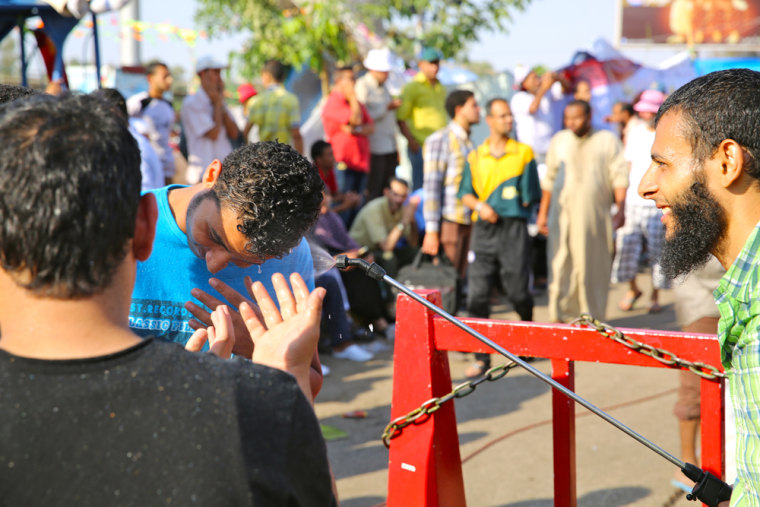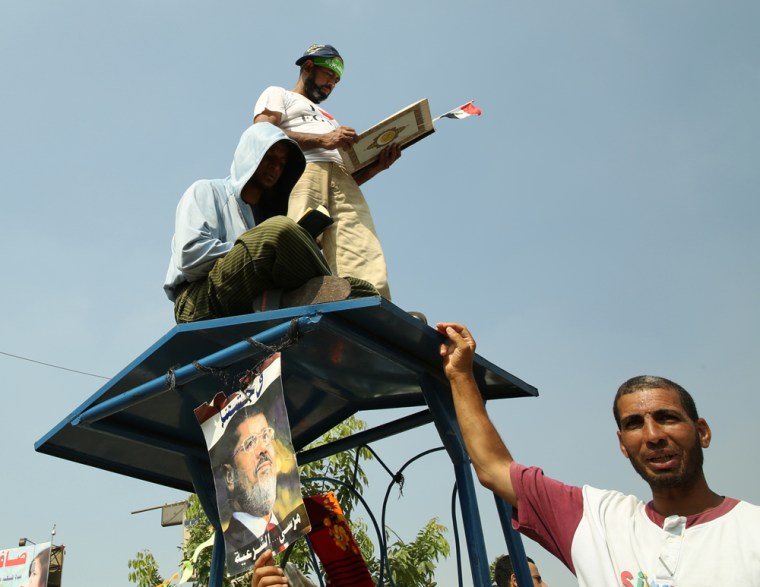
CAIRO – Muslims around the globe began the holy month of Ramadan this week, a time when believers are required to abstain from food and water from dawn until dusk.
Despite the oppressive summer heat and their fast, thousands of Muslim Brotherhood supporters of ousted Egyptian President Mohammed Morsi have continued their protest in Cairo’s Nasr City.
“We are against oppression, we are against illegitimacy. We want our rights. We gave votes, and we want to keep them,” said Issam ElDin Ismaeel, an English instructor at Al-Azhar University. “We are staying here until the end of this protest, and that protest won’t end until he gets back to his rule,” he lamented, his voice hoarse from the lack of water.
Protesters have endured long 14-hour days since the holy month began Wednesday. They rested in makeshift tents, dozens of men at a time. The women, some donning hijabs, others in face-covering niqabs, had tents of their own. Men carrying large water pumps on their backs sprayed water onto the faces of those consumed by the heat. Young men carried large chunks of ice around the encampment, using them for air-conditioning.
Some people read the Quran, others slept. They acknowledged that their objective – to see Morsi reinstated – was difficult to begin with, but had become even harder in the heat – and they were only a few days into their fast.
“God helps us if we are fasting or not fasting because we have an aim and it’s a legal aim,” said Ahmad Khalil, a teacher sporting a tan safari hat who was one of roughly 20 guards securing the entrance to Nasr City, searching bags and performing pat downs.
“We insist on achieving our aim.”

The people staging the sit-in outside the Rabia Al Adawiyya mosque said that even though Morsi won Egypt’s first free elections with just over 51 percent of the vote in 2012, exactly one year after he assumed office, the outcome of democracy was illegally stripped from him.
Even in the 91-degree Fahrenheit heat, the mood in Nasr City remained defiant. Two men climbed a 10-foot outpost, where they read the Quran and prayed, looking down on hundreds of Morsi supporters, many displaying Egyptian flags small and large. One woman said the atmosphere reminded her more of the Hajj in Mecca than an act of political expression, even as hundreds of posters of Morsi fluttered gently in the hot summer air.
For Ismaeel, the English instructor, the challenge was invigorating. “The fact is that fasting makes us stronger and gives us more energy, because our relationship to God is near here,” he said. “We pray in the heat of the sun. We call our God. We call him to give us victory, and, God willing, we will get it.”
So far, the new interim government headed by President Adly Mansour and Prime Minister Hazem el-Beblawi has shown no signs of giving in to these protesters’ demands, which angered 42-year-old consultant Amr Bahaa.
“The most difficult thing is that there’s no response to our needs,” he said. Even so, Bahaa believed the struggles of Ramadan would put God on their side. “Allah is with us all the time, whether we are fasting or not. But when we are fasting, the reply will be faster.”
In the fight for Egypt’s political future, one woman likened the current crisis to some of Islam’s historic battles, where victories were realized during the holy month.
“Ramadan is the month of Islamic victories,” said Dr. Wafaa Hefny, a 46-year-old literature professor. “We will not stop, we will be killed here. Either we get Morsi back or we’re back to a police state… and after the [January] 25th revolution, we're never going back to that.”
Related stories:
- Million person march? Morsi supporters plan huge rally in Cairo
- 'Fasting makes us stronger' Cairo protesters carry on despite Ramadan
- Egypt's women watch protests from sidelines amid fears of sexual violence
- US reviews Egypt aid as Arab nations pour $12B into post-Morsi regime
- 'No sympathy': Egypt divided in wake of violent clashes